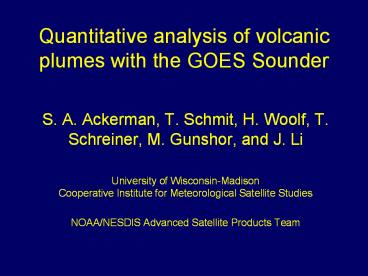Quantitative analysis of volcanic plumes with the GOES Sounder - PowerPoint PPT Presentation
1 / 47
Title: Quantitative analysis of volcanic plumes with the GOES Sounder
1
Quantitative analysis of volcanic plumes with the
GOES Sounder
- S. A. Ackerman, T. Schmit, H. Woolf, T.
Schreiner, M. Gunshor, and J. Li - University of Wisconsin-MadisonCooperative
Institute for Meteorological Satellite Studies - NOAA/NESDIS Advanced Satellite Products Team
2
Motivation
- Plumes of SO2, along with other gases, and ash,
are expelled from the erupting volcanoes. - Climatic impacts SO2 -gt H2SO4
- Aviation safety
- Detection of these SO2 plumes has been
accomplished via the AHVRR, HIRS, MODIS, AIRS,
OMI, TOMS, etc. - GEO provides complete temporal coverage
3
Volcanic Ash
- Passive IR detection based on variouscombination
s of - 3.9, 8.5 10.7, and 12.0 ?m
4
Volcanic Gases
Gases include water vapor, sulfur dioxide
(SO2), chlorine, hydrogen sulfide, nitrogen
oxides One of many processes oxidation and
hydration of SO2 -gt H2SO4 (sulfuric acid) The
resulting ash/acid mix is highly corrosive and
can cause damage to jet engines and external
parts of the aircraft, and there are climate
implications.
5
SO2 detection
- Strong SO2 absorption at 7.3 µm and weak SO2
absorption at 8.5 µm - Detection accomplished via various combinations
of observations at - 6.7, 7.3, 8.5, and 11 µm
6
GOES Sounder Channels
The Sounder has a 10 km IFOV once per hour
temporal coverage over USA. (Coverage over
Caribbean is less.)
SO2 plume detection is a band difference image
based on the 7.4 µm (sensitive to Sulfur Dioxide)
and a CO2 absorption band (Band 5, 13.3 µm and
not sensitive to SO2). Band 5 is chosen because
the weighting function (i.e. the region or
vertical layer of the atmosphere these spectral
bands are most sensitive to changes) for both
bands peak around the same region of the
atmosphere.
13.4
7.4
7
SO2 calculations from F. Prata
After Schmit et al. 2005, BAMS
8
Retrieval
9
Simulations
Sensitive to SO2 altitude and atmospheric profile.
10
First case July 2003
Soufriere Hills Volcano, Montserrat on 12 July
2003 (around 0230 UTC, 13 July 2003), triggered
by a major collapse of the lava dome
Photo by
11
GOES-12 Sounder Band 10 (7.4 µm) Band 5
(13.3µm)
13 July 2003 1320 UTC
13 July 2003 1920 UTC
?
14 July 2003 0120 UTC
12
AIRS Retrieval (F. Prata)
13
GOES BT 7.4-BT 13.4
14
GOES SO2 Retrieval
15
May 21-22, 2006Prata retrieval from AIRS
16
MAY 20, 2006 0720 UTC
17
MAY 20, 2006 1320 UTC
18
MAY 20, 2006 1920 UTC
19
MAY 21, 2006 0120 UTC
20
MAY 21, 2006 0720 UTC
21
MAY 21, 2006 0920 UTC
22
MAY 21, 2006 1020 UTC
23
MAY 21, 2006 1120 UTC
24
MAY 21, 2006 1520 UTC
25
MAY 21, 2006 1620 UTC
26
MAY 21, 2006 1720 UTC
27
MAY 21, 2006 2120 UTC
28
MAY 21, 2006 2220 UTC
29
MAY 21, 2006 2320 UTC
30
MAY 22, 2006 0320 UTC
31
MAY 22, 2006 0420 UTC
32
MAY 22, 2006 0520 UTC
33
MAY 22, 2006 0620 UTC
34
MAY 22, 2006 0920 UTC
35
MAY 22, 2006 1020 UTC
36
MAY 20, 2006 1320 UTC
CO2 slicing can estimate ash heights.
37
MAY 20, 2006 1920 UTC
38
MAY 21, 2006 0120 UTC
39
SO2 GOES Sounder
Ash cloud
40
SO2 GOES Sounder
Ash cloud
41
SO2 GOES Sounder
SO2
42
SO2 GOES Sounder
SO2
43
SO2 GOES Sounder
44
SO2 GOES Sounder
45
Next Generation GOES
ABI Advanced Baseline Imager
After Schmit et al. 2005, BAMS Slightly shifted,
toward larger wavenumbers, the two narrow ABI
water vapor bands to better discriminate the SO2
peak.
46
Next Generation GOES
BT difference (K)
ABI Wavelength (micron)
Current GOES imager doesnt have capability.
47
Summary
- Current GOES Sounder can track SO2 plumes from
volcanoes. - The temporal resolution delineates the evolution
of the plume. - Estimates of total loading require profile and
altitude profile from sounder. - Estimates of 20-22 May 2006 and July 2003
eruptions of Montserrat are consistent with AIRS
retrieval by Prata (GOES a bit too high). - Next generation GOES imager will be better suited
for detection and retrieval.































